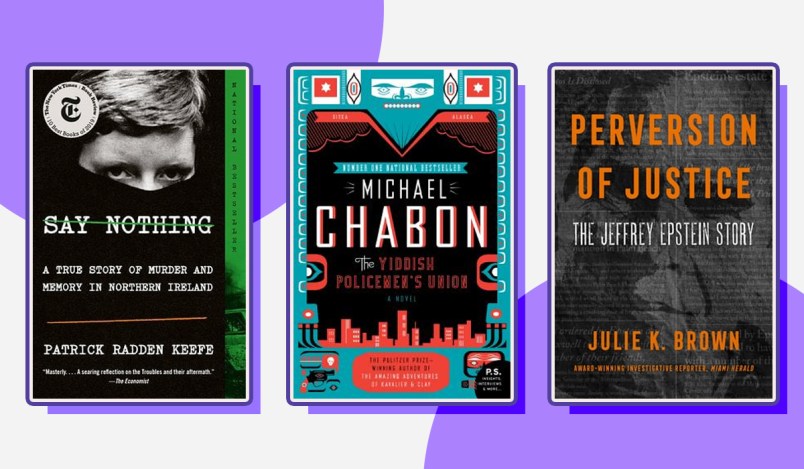We’re asking our fellow TPMers to share their own personal reading recommendations: books they love or that have shaped their lives.
Comment below with some of your favorites! Also: You can always purchase any of the books by visiting our TPM Bookshop profile page.
Reporter Matt Shuham is up this month. Here are six books that have kept him busy during the pandemic.
Say Nothing: A True Story of Murder and Memory in Northern Ireland
Patrick Radden Keefe made waves this year for another book, “Empire of Pain,” about the Sackler family. I haven’t gotten to that one yet, but “Say Nothing” is a captivating dive into Northern Ireland’s “troubles,” and particularly the transition away from terroristic violence and imperial domination that marked either side of the struggle. In the middle of bloody conflict, violence — one’s proximity to it, and their willingness to inflict it on others — becomes its own currency, and “Say Nothing” offers a detailed balance sheet. I couldn’t read this book without a recent quote bouncing around my head: “If you are raising a young man, please raise them to be a monster,” Rep. Madison Cawthorne (R-NC) recently urged new mothers; the quote would be unremarkable in Belfast’s worst days.
The Library Book
Susan Orlean takes the 1986 Los Angeles’ Central Library fire — a massive and traumatic event for the city, buried in national news by the Chernobyl disaster — and runs it through a literary MRI machine, slicing it into component bits and diving into each with a care and precision. Readers won’t learn exactly how the fire came to tear through the massive building, but they’ll know more about it than any judge or jury could. After digging through centuries of California history, library science, book-drying best practices and one of L.A.’s strangest nights of television, Orlean establishes modern libraries as essential community hubs, and librarians as public stewards of our collective soul.
Reign of Terror: How the 9/11 Era Destabilized America and Produced Trump
As long as there’s been a “War on Terror,” TPM alum Spencer Ackerman has reported on it, and this book offers an efficient, striking summary of his life’s work. Many of the books on my list this week are by journalists, and among those “Reign of Terror” is admirable for reasons that might not be immediately apparent: Ackerman has kept his eye on the ball for 20 years. Through three presidents, he’s chronicled our murderous adventures in the Middle East, and the corresponding degradation of civic life back home. The last president learned a crucial lesson in that time, Ackerman argues: Donald Trump could successfully employ superficial “anti-war” rhetoric because he understood that the true heart of the War on Terror was racism — something he could easily exploit at home.
Perversion of Justice: The Jeffrey Epstein Story
I grew up in South Florida, and Julie Brown is one of several outstanding reporters from my hometown Miami Herald. Growing up, I knew Brown’s work covering the brutality of Florida’s carceral system, a beat that seems to have cultivated an impossible fearlessness and persistence in her. And those traits were exactly what was needed to crack open the story of Jeffrey Epstein, his victims, and most importantly, the criminal justice system that essentially acted as Epstein’s accomplice. “Perversion of Justice” tells that story, as well as Brown’s struggle to “make it” as a reporter, even a successful and accomplished one, in an industry that mostly hasn’t figured out how to pay journalists what they’re worth.
The Complete Personal Memoirs of Ulysses S. Grant
I’ll admit it: I’m no military historian. Nonetheless, U.S. Grant’s memoirs are captivating. In between the detailed play-by-plays of battlefields — not only the Civil War, but the Mexican-American War before it — he recalls with startling clarity the parallel logistical efforts necessary to win a war: building bridges, providing bread and coffee to thousands of semi-disgruntled men, and stringing thousands of miles of telegraph wire.
Grant also offers a window into America’s elite coming to terms with the new country they would soon lead. Historian Eric Foner called the ratification of the revolutionary 13th, 14th and 15th Amendments America’s “Second Founding,” and in that sense, Grant is a Second Founding Father. One line in particular stands out: “As time passes, people, even of the South, will begin to wonder how it was possible that their ancestors ever fought for or justified institutions which acknowledged the right of property in man.”
The Yiddish Policemen’s Union
I realized this list is a bit heavy. Lots of death and destruction. So hopefully this evens things out. Michael Chabon’s 2007 book is essentially Jewish “Archer” — with a heavy dose of alternate history. In Chabon’s world, Jewish refugees have found a home in Sitka, Alaska, and the frozen landscape provides the perfect backdrop for a Yiddish detective novel. Our semi-hero, Meyer Landsman, finds his life in shambles and his leads on a mysterious murder running dry. But there are answers in Sitka, and Landsman, along with his half-Jewish, half-Tlingit partner Berko Shemets, is determined to find the truth.







“Busy During The Panini” OMG LOLOLOLOLOLOL
Hectic during the hoagie, even.
I’ve been flummoxed during the falafel. Never had any issues with panini.
I love not checking audio translation and auto correct. Panini>>>please make note when this hilarious blooper is edited as others will miss out…made my day!!! Yes, it was supposed to be Pandemic, but it’s much funnier as panini.